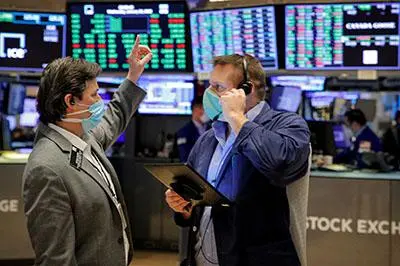PHOTO
SINGAPORE: Oil jumped to a seven-year high, safe-havens rallied and U.S. stock futures dived on Tuesday as Europe's eastern flank stood on the brink of war after Russian President Vladimir Putin ordered troops into breakaway regions of eastern Ukraine.
Brent crude futures rose 1.6% to $96.94, just off their overnight seven year high. S&P 500 futures fell 1.5% and Nasdaq futures fell 2.2%. Asian stocks were also down over half a percent, while Japan's Nikkei skidded sharply.
The Russian rouble briefly touched an 18-month low in early Asia trade on Tuesday, after Russia's MOEX equity index .IMOEX had fallen 10.5% the day before.
Spot gold, in contrast, hit a new six-month top of $1,911.56.
Putin on Monday recognised two breakaway regions in eastern Ukraine as independent and ordered the Russian army to launch what Moscow called a peacekeeping operation into the area, upping the ante in a crisis that could unleash a major war.
A Reuters witness saw columns of military vehicles including tanks early Tuesday on the outskirts of Donetsk, the capital of one of two breakaway regions, and Putin signed treaties with leaders of the two breakaway regions giving Russia the right to build military bases.
Washington and European capitals condemned the move, vowing new sanctions. Ukraine's foreign minister said he had been assured of a "resolute and united" response from the European Union.
But it was not immediately clear whether the Russian military action would be regarded by the West as the start of a full-scale invasion.
Following Russia's latest move "we are much closer to military intervention, which of course is going to drive a lot of the risk off sentiment in the markets,” said Carlos Casanova, senior Asia economist at UBP, adding the short term volatility in markets caused by both geopolitical factors and the U.S. Federal Reserve was 'relentless'.
Casanova said the consequences would be higher oil prices, an equity sell off, and people flocking to safe haven assets like the Japanese yen.
MSCI's broadest index of Asia Pacific shares outside Japan lost 0.66% in early trade on Tuesday and Japan's Nikkei tumbled 1.6%.
In currency markets, the safe-haven yen rose as much as 0.2% in Asia to a nearly three-week high of 114.50 per dollar, before paring its gains.
The euro fell 0.1% to a one-week low of $1.1296
"In these circumstances, risk metrics are the driving force," said NAB head of foreign exchange strategy, Ray Attrill.
The nerves also drove U.S. Treasury yields lower, with benchmark 10-year Treasury yields diving as much as 5.5 basis points to 1.8715%. Bets on Federal Reserve rate hikes also eased and the chance of a 50-bp hike next month fell below 1-in-5.
U.S. policy makers have been sparring publicly about how aggressively to begin tightening.
Federal Reserve Governor Michelle Bowman said on Monday that she will assess incoming economic data over the next three weeks in deciding whether a half percentage point interest rate rise is needed at the central bank's next meeting in March.
(Reporting by Tom Westbrook in Singapore and Xie Yu in Hong Kong; additional reporting by Alun John in Hong Kong ; editing by Jane Wardell & Shri Navaratnam) ((tom.westbrook@tr.com; +65 6973 8284;))
((To read Reuters Markets and Finance news, click on https://www.reuters.com/finance/markets For the state of play of Asian stock markets please click on: 0#.INDEXA ))





















